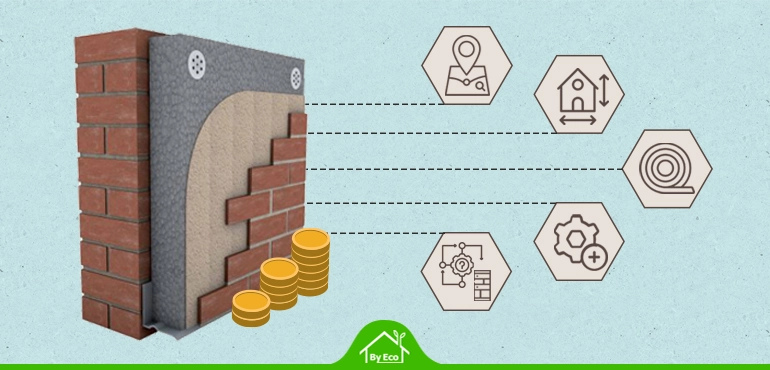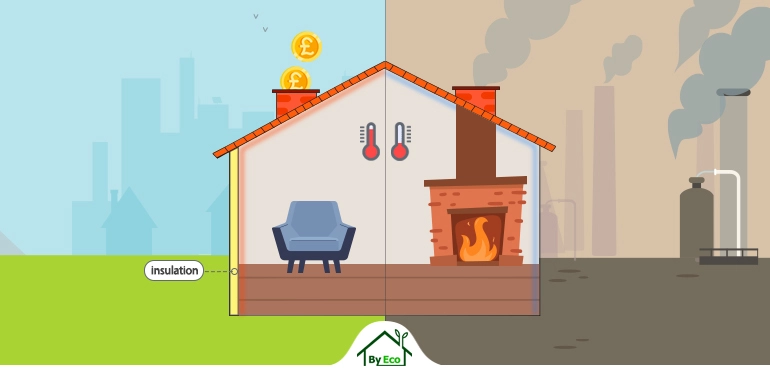Wall Insulation and UK Grants 2024

- UK Wall Insulation in 2024
- Types of Wall Insulation Materials
- Factors Influencing Wall Insulation Costs
- How Government Grants Can Help with Wall Insulation Costs
- Highlighting Environmental Impact
- Benefits of Proper Wall Insulation
- Eligibility Criteria for UK Government Grants
- Begin Your Journey
- FAQs
In 2024, wall insulation remains a critical aspect of enhancing energy efficiency and comfort in homes across the UK. With the country's diverse climate and rising energy costs, ensuring adequate insulation in walls is essential for homeowners seeking to reduce heating bills and create a more comfortable living environment.
Wall insulation serves as a barrier against heat loss during the colder months and helps maintain cooler temperatures in the summer, contributing to year-round comfort. Additionally, properly insulated walls can also mitigate issues such as dampness and condensation, protecting the structural integrity of homes.
As technology advances and new insulation materials become available, homeowners have a wider range of options to choose from, allowing them to tailor their insulation solutions to suit their specific needs and budget.
With the support of government grants and initiatives aimed at promoting energy efficiency, more homeowners than ever can access affordable solutions to improve the insulation of their walls, ultimately leading to cost savings and a more sustainable future for all.
Types of Wall Insulation Materials
When it comes to insulating your walls, various materials offer unique properties and benefits tailored to different needs and preferences. Understanding the characteristics of each type of insulation material can help you make informed decisions about the best solution for your home. Let's explore some of the most common types of wall insulation materials in more detail:
Fibreglass Insulation: Fibreglass insulation is one of the most popular and widely used insulation materials on the market. It is made from fine glass fibres and is available in batts, rolls, or loose-fill forms. Fibreglass insulation is renowned for its cost-effectiveness, fire resistance, and versatility. It effectively reduces heat transfer and enhances energy efficiency by creating a thermal barrier in your walls.
Advantages:
- Cost-effective solution for homeowners on a budget
- Excellent fire resistance properties
- Versatile and easy to install in various wall cavities
Considerations:
- Requires proper handling to avoid skin irritation
- May settle over time, reducing effectiveness if not installed correctly
Polyurethane Foam Insulation: Polyurethane foam insulation is known for its high thermal performance and superior sealing properties. It comes in various forms, including spray foam, rigid foam board, or foam panels. Polyurethane foam creates an airtight seal, minimising air leakage and maximising energy efficiency in walls. While it typically has higher upfront costs, it offers long-term savings and benefits.
Advantages:
- Superior thermal performance and energy efficiency
- Creates an airtight seal, reducing air leakage and drafts
- Durable and long-lasting insulation solution
Considerations:
- Requires professional installation due to its application process
- May expand after application, requiring careful planning to prevent overfilling
Polystyrene Insulation: Polystyrene insulation comes in two main forms: expanded polystyrene (EPS) and extruded polystyrene (XPS). EPS insulation is lightweight and cost-effective, suitable for various wall applications. XPS insulation has a denser composition, making it ideal for below-grade and damp environments. Both types offer excellent thermal and moisture resistance properties.
Advantages:
- Lightweight and easy to handle during installation
- Excellent thermal insulation and moisture resistance
- Resistant to mould, mildew, and pests
Considerations:
- May release toxic fumes if burned
- Higher upfront costs compared to other insulation materials
Mineral Wool Insulation: Mineral wool insulation is made from natural minerals like basalt or rock. It offers excellent fire resistance, thermal insulation, and soundproofing properties. Mineral wool is available in batts, rolls, or loose-fill forms, making it suitable for various wall cavities. It is also resistant to moisture, mould, and pests, making it a durable and long-lasting insulation solution.
Advantages:
- Excellent fire resistance and thermal insulation properties
- Provides effective soundproofing and acoustic control
- Resistant to moisture, mould, and pests
Considerations:
- Can be heavier and more challenging to install than other materials
- May require protective equipment during installation due to its fibrous nature
Cellulose Insulation: Cellulose insulation is made from recycled paper and treated with fire-retardant chemicals. It is an eco-friendly option that offers excellent thermal insulation and soundproofing properties. Cellulose insulation is blown into wall cavities using specialised equipment, ensuring complete coverage and a tight seal. It is also resistant to mould, pests, and fire, making it a popular choice for homeowners seeking sustainable and effective insulation solutions.
Advantages:
- Environmentally friendly and made from recycled materials
- Provides excellent thermal insulation and soundproofing
- Resistant to mould, pests, and fire
Considerations:
- Requires professional installation with specialised equipment
- May settle over time, requiring periodic inspections and top-ups
By understanding the characteristics and benefits of each type of wall insulation material, you can select the most suitable option for your home's specific needs, budget, and environmental considerations. Whether you prioritise cost-effectiveness, thermal performance, or sustainability, there's a wall insulation material that's right for you.
Factors Influencing Wall Insulation Costs

Property Size: Larger homes generally require more insulation material, leading to higher overall costs.
Insulation Material: The type of insulation material selected influences expenses. Premium materials like polyurethane foam may have higher upfront costs but offer superior thermal performance and long-term savings.
Wall Condition and Complexity: The condition of the walls and the complexity of the installation process affect costs. Homes with irregular wall structures or accessibility challenges may require more labour and specialised equipment, leading to increased expenses.
Geographic Location: Costs may vary depending on regional living expenses and accessibility. While our insulation services are tailored specifically for UK residences, areas with higher living expenses or remote locations may have higher service charges.
Installation Quality and Additional Features: The quality of installation and any additional features, such as vapour barriers or soundproofing layers, can contribute to the final cost.
How Government Grants Can Help with Wall Insulation Costs
You may be eligible for free wall insulation through UK government grants, including the Great British Insulation Scheme (GBIS) and the Energy Company Obligation (ECO4) scheme.
The Great British Insulation Scheme (GBIS)
Initiated in April 2023, GBIS aims to deliver cost-effective insulation measures to a broad range of households, focusing on both broader and low-income groups, thereby enhancing access to insulation and contributing to quicker, more effective energy efficiency improvements across the UK.
The Energy Company Obligation (ECO4):
Active from April 2022 to March 2026, (ECO4) targets the enhancement of insulation and heating systems in homes across the UK, with a focus on supporting low-income, fuel-poor, and vulnerable households. It facilitates the adoption of energy-saving measures, providing funding for upgrades like cavity wall, loft, and underfloor insulation. This scheme is instrumental in reducing energy bills and carbon emissions, making homes warmer, more comfortable, and environmentally friendly.
Highlighting Environmental Impact

Wall insulation not only enhances energy efficiency and reduces heating bills but also contributes to environmental sustainability. By minimising heat loss and reducing energy consumption, wall insulation helps lower carbon emissions and mitigate climate change. Additionally, insulation materials derived from recycled or eco-friendly sources contribute to resource conservation and promote sustainable building practices.
Benefits of Proper Wall Insulation
Proper wall insulation offers numerous advantages for homeowners. One significant benefit is the maintenance of consistent indoor temperatures throughout the year, ensuring a comfortable living environment regardless of external weather conditions. Insulation reduces heat loss in winter and heat gain in summer, helping regulate indoor temperatures and minimising the need for excessive heating or cooling.
This not only increases comfort but also leads to significant savings on energy bills over time. Additionally, insulation improves soundproofing by reducing noise transmission from outside, creating a quieter and more peaceful indoor environment.
Moreover, proper insulation helps prevent moisture-related issues such as dampness and condensation within walls.
This preservation of the structural integrity of the building promotes healthier indoor air quality. Overall, investing in proper wall insulation is a wise decision that pays off through improved comfort, energy savings, and long-term structural integrity of the home.
Eligibility Criteria for UK Government Grants
Discover your eligibility for free wall insulation services under ECO4 or GBIS by completing our form. Our partnership with the government ensures that qualifying homes receive the necessary insulation upgrades for free or at a reduced cost.

Steps After Eligibility
- If you're a tenant: we coordinate with your landlord to ensure all contributions and permissions are in place.
- Home Assessment: Our assessors will visit to pinpoint the ideal energy solution for you.
- Scheduling Your Installation: We arrange installation at your convenience, using verified installers to do the job right.
Begin Your Journey
Ready to start your journey towards a more sustainable and energy-efficient home? Unlock the potential of government grants for wall insulation today. Schedule your complimentary home assessment and take the first step towards a greener future. Our team is dedicated to guiding you through the process, from eligibility determination to expert installation. Contact us or fill out our form to get started on transforming your home with eco-friendly solutions, all at no cost for qualifying households.
